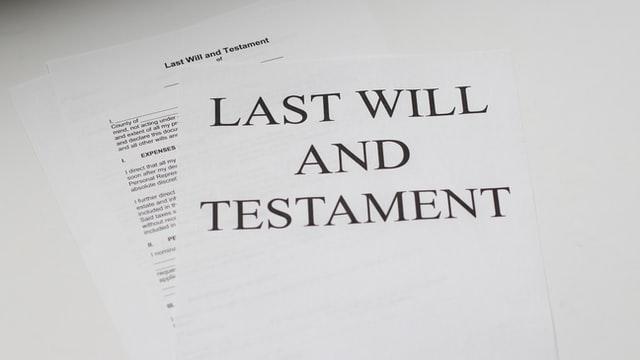Section 1 – What is the Difference between Being “Separated” and “Divorced”?
Section 2 – Do I Need to Go to Court to Get a Divorce in Ontario?
Section 3 – Can I Make a Claim for Divorce?
Section 4 – What Should I do Before Making a Claim for Divorce?
What is the Difference between “Separation” and “Divorce”?
You can be “separated” if your marriage or common-law relationship breaks down; however, only people that are married can get “divorced.”
If your marriage breaks down, and you separate from your spouse, you are still legally “married” to your spouse until a divorce in Ontario is granted by a court. You can still be legally separated from your spouse if you are “living under the same roof.”
A) Inheriting Under a Will
When you separate from a partner, it is recommended that you review and update your Will and any existing Powers of Attorney for Personal Care and/or Property to ensure they still reflect your current wishes. Depending on the complexity of your assets and personal situation, it may be vital that you consult with a lawyer about updating or preparing a Will and Powers of Attorney.
Separated
| If you are married but separated, and your spouse passes with a Will: | If you are married but separated, and your spouse passes without a Will: |
| a) leaving you as an Executor or beneficiary under his or her Will, then you will still be able to act as an Executor or stand to inherit in accordance with the terms of the deceased’s Will; OR b) you can elect to make a claim for equalization (i.e., property division under the Family Law Act, R.S.O. 1990, c. F.3 against your separated spouse’s estate. You may wish to do this if your separated spouse’s Will provides less than you would have been entitled to if you had made a property claim at family court because of the separation. | a) you will still be entitled to a share of your separated spouse’s estate under the laws of intestacy as set out in Part II of the Succession Law Reform Act, R.S.O. 1990, c. S. 26 (i.e., a married spouse is entitled to the first $200,000 of the estate as a “preferential share” and the balance of the estate is divided between a spouse and any living children of the deceased in equal shares); OR b) You can elect to make a claim for equalization (i.e., property division under the Family Law Act, R.S.O. 1990, c. F.3. against your separated spouse’s estate. |
If the surviving spouse elects to make an equalization claim against the estate of their separated spouse where there is a Will, or no Will, then they must file the election within 6 months of the date of the spouse’s death, unless you bring an application at court for an order to extend the time limit. The election must be filed in person or by mail with the office of the Estate Registrar for Ontario. For more information see “How do I file an election under the Family Law Act” on the Ontario Ministry of the Attorney General’s website.
If the surviving spouse does not file an election within 6 months of their separated spouse’s death then it shall be “deemed” that they chose to inherit under the Will or receive the entitlement provided for under the Succession Law Reform Act, R.S.O. 1990, c. S. 26 (i.e., intestacy or partial intestacy) (see section 6(11) of the Family Law Act, R.S.O. 1990, c. F.3.:)
Divorced
If you are divorced and your former partner passes away:
| If you are divorced and your former spouse passes with a Will: | If you are divorced and your former spouse passes without a Will: |
| leaving you as the Executor or beneficiary or confers a special or general power of appointment under his or her Will, then those provisions of the Will are interpreted as if you predeceased your former spouse; UNLESS your deceased former spouse expressly intended otherwise (i.e., in his or her Will, Separation Agreement or some other document) that you may act as an Executor, inherit as a beneficiary or be conferred a general or special appointment under his or her Will even if a divorce in Ontario was granted or a separation agreement was signed where you released all property rights against the deceased. | you will not be entitled to any share of the deceased’s estate under the Succession Law Reform Act, R.S.O. 1990, c. S.26. |
Separated – Common Law Relationship
If your common-law partner named you as an Executor or a beneficiary in his or her Will at the time of his or her death, then you may still act as the Executor or inherit under the Will even though you were separated from the deceased.
If your common-law partner passed away without a Will then you do not have automatic property rights against his or her estate under the law.

B) Employee Benefits – Coverage as Spouse May Depend on Relationship Status
Employee benefits vary in their definition of ‘spouse.’ Who is entitled to make claims and receive reimbursement from an employee’s benefit plan may vary depending on whether you are “separated” or “divorced”.
For example, some employee benefit plans disqualify a separated spouse from making personal health and/or dental claims (but not those relating to eligible dependent children) on the employee’s benefits plan immediately upon separation. In this situation, the employee should inform their benefits provider of the change in their relationship status in order to ensure that the benefits provider does not improperly payout on claims made by their separated spouse if they are not eligible for coverage. Otherwise, the employee may be required to reimburse the benefits provider for claims improperly paid out to the separated spouse. This applies to situations where a married or common-law spouse is entitled to benefits until he or she is ‘separated’ from the employee.
Other employee benefit plans permit a “spouse” to make claims on a benefits plan until a divorce is granted or even after a divorce is granted if he or she is the recipient of spousal support and is a dependent of the employee pursuant to a court order or separation agreement.
You should double-check your employee benefits plan booklet when separating to verify that your “spouse” remains eligible for benefits and update your relationship status with your benefits provider to avoid liability for claims improperly paid out.

C) Time Limits on Making Certain Claims at Court May be Affected
Regardless of whether you are separated or divorced, there is no time limit (or “limitation period”) on when a common-law spouse or former spouse can make a spousal support claim against a living spouse/former spouse under s. 16(1)(c) of the Limitations Act, 2002, S.O. 2002, c. 24, Sched. B. If your spouse is deceased, there is a 6-month time limit to make a ‘dependent’s relief’ claim against his or her estate from the grant of letters probate of the will or of letters of administration. However, family courts will often consider whether there was a delay in making a claim for spousal support and the passage of time may be “prejudicial” to the claim.
Separated
If you are married and then separate, you have 6 years from the “date of separation” to make a property claim (or “equalization” claim) against your spouse at court. After that date, you are “statute-barred” from bringing a property claim that relates to the breakdown of your marriage to court; although in some situations, there may be an argument for extending the 6 year limitation period under section 2(3) of the Family Law Act, R.S.O. 1990, c. F.3 and you should consult a family law lawyer to discuss your situation.
The limitation period for making an equalization claim at court against your separated spouse is shortened to 6 months if he or she passes away and an election must be filed with the office of the Estate Registrar of Ontario.
Divorced in Ontario
Under s. 7(3) of the Family Law Act, R.S.O. 1990, c. F.3 if you are divorced then the limitation period is shortened for a former spouse’s ability to make a property claim (i.e., equalization claim under the Family Law Act, R.S.O. 1990, c. F.3) to 2 years from the date of divorce in Ontario (or within 6 years from the date of separation if this period results in a shorter timeframe to bring the property claim).
For example, if the parties separated on January 1, 2015 then the 6 year limitation period for making a property claim ends January 1, 2021. If the parties divorced on February 14, 2020, then the limitation period for making a property claim against a former spouse is still January 1, 2021 (i.e., within the 6-year time limit from when they separated, not February 14, 2022 which is 2 years after the divorce).
| Note: As a result of the COVID-19 pandemic, the Lieutenant Governor in Counsel made an order under s. 7.1 of the Emergency Management and Civil Protection Act, R.S.O. 1990, c. E.9 suspending limitation periods and procedural time periods. The suspension is retroactive to March 16, 2020. |
Do I Need to Go to Court to Get a Divorce in Ontario?
Yes — in Ontario, only the Superior Court of Justice or a Unified Family Court has the authority to grant divorces (i.e., the Ontario Court of Justice does not have jurisdiction). You cannot get a divorce by signing a separation agreement or through other means.
If you are only making a claim for a divorce, and your spouse does not ‘contest’ the divorce (i.e., file responding material), then you may not need to appear before a judge in court as all the paperwork may be dealt with by a judge “in chambers.” In this situation, you will have to file certain documents at court, which will be processed at the courthouse, and you will receive a Divorce Order in the mail granting you a divorce. The divorce is effective within 31 days of the date on the Divorce Order. It is strongly recommended that you obtain a Divorce Certificate from the courthouse after your divorce is effective as this document is needed in the event that you would like to re-marry in the future.
If you are making a claim for a divorce in Ontario but your spouse files responding materials (i.e., Answer, 35.1 Affidavit and/or Financial Statement) disputing the date of separation or making claims against you arising from the breakdown of the marriage then you will need to file reply materials (i.e., Reply, 35.1 Affidavit and/or Financial Statement) and attend court to address the claims in dispute. The family litigation process is different than that of civil litigation or criminal law matters and is governed not only by the Family Law Rules, O. Reg. 114/99 but also the Rules of Civil Procedure, R.R.O, 1990, Reg. 194. Family litigation also has its own special court forms.
Can I Make a Claim for Divorce in Ontario?
In Ontario, if there has been a marriage breakdown, spouses do not have to “agree” to ending the marriage or obtaining a divorce. If one spouse wishes to end the marriage, then he or she is entitled to make a claim for divorce if certain criteria are met. The Divorce Act, R. S. C. 1985, c. 3 (2nd Supp.) addresses the criteria for divorce (and “corollary relief” – i.e., child support, spousal support, etc.) and applies to all provinces and territories in Canada, including Ontario.
Section 3(1) of the Divorce Act, R.S.C. 1985, c. 3 (2nd Supp.) permits a Superior Court of Justice or Unified Family Court in Ontario to hear a divorce proceeding if either party has been “ordinarily resident” in the province for at least one year immediately before of the start of the divorce proceeding.
If your spouse already started a divorce proceeding in another court (that had the authority to deal with the divorce) then you may not start a 2nd divorce proceeding at a different courthouse.
Section 8 (2) of the Divorce Act, R.S.C. 1985, c. 3 (2nd Supp.) provides that a spouse can seek a divorce by establishing a breakdown of the marriage. There are 3 “grounds” you can claim a divorce:
1) the parties have been living separate and apart for at least one year immediately before the divorce proceeding started (note: you can live “separate and apart” from your spouse while living “under the same roof”);
2) your spouse committed adultery during the marriage; OR
3) your spouse treated you with “physical or mental cruelty of such kind as to render intolerable the continued cohabitation of the spouses.”
If you and your spouse have children (e.g., who are under 18 years old or over 18 years old but pursuing a post-secondary educational program, disabled or unable to withdraw from parental support for health reasons), then a court may refuse to grant a divorce if there are no reasonable financial arrangements in place for the children (e.g., child support arrangements are usually set out in a separation agreement or court order).
What Should I do Before Making a Claim for Divorce in Ontario?
Explore the Possibility of Reconciliation
Whenever possible, spouses should explore the possibility of reconciliation before deciding to terminate their marriage. Marriage counselling, family members, a religious leader or friends can sometimes assist spouses in reconciling their marital differences.
Updating the Canada Revenue Agency as Marital Status May Affect Government Benefits
You must update the Canada Revenue Agency about a change in your relationship status, which includes a separation due to a breakdown in the relationship of more than 90 days and divorce. The Canada Revenue Agency will recalculate your benefits based on your new relationship status and adjusted family net income. Learn more about updating your information with Canada Revenue Agency.
Obtain the Marriage Certificate – Original or Certified Copy
In order to obtain a divorce, the original marriage certificate (or a certified copy) must be provided to the court. If you no longer have your original marriage certificate and were married in Ontario, you can obtain a certified copy from the provincial government by ordering it online.
Many other provinces and territories in Canada also have government websites that allow you to obtain a certified copy of a marriage certificate if you were married in that jurisdiction:
- Newfoundland and Labrador
- Prince Edward Island
- Nova Scotia
- New Brunswick
- Quebec
- Manitoba
- Saskatchewan
- Alberta
- British Columbia
- Nunavut
- Yukon
- Northwest Territories

Review and Update Beneficiary Designations on Life Insurance, RRSPs, TFSAs, etc
A separation or divorce will have no effect on a beneficiary designation filed at a financial institution or insurer. For example, if you divorced and remarried and forgot to update your beneficiary designation on a TFSA account, then that TFSA account will go to your former partner if that is what is stated on the beneficiary designation! It is very important to review all your beneficiary designations when a separation occurs to ensure they reflect your current intentions.
When there is a child support and/or a spousal support obligation, it may be appropriate to maintain your separated or divorced former partner as a beneficiary on your life insurance policy to secure a support obligation that may be outstanding as at the time of your death. If child support and/or spousal support are issues in your separation then it is recommended that you consult with a lawyer to discuss support obligations, how much is “security” is required to cover support obligations, etc.
Address Child Support Obligations
In order to be granted a divorce, a family court will require that there be “reasonable arrangements” for the support of any child that is entitled to child support. Child support is usually outlined in a separation agreement or court order. If a court is not satisfied that there are reasonable arrangements in place for children entitled to support, a divorce can be denied.
Address Other Issues Arising from the Breakdown of a Marriage if Possible
Upon separating from your spouse, there may be several issues arising out of the breakdown of your marriage that would be wise (but not mandatory) to resolve before starting a court application for divorce, i.e., property division, spousal support, parenting time, parental-decision making, etc.
If possible, spouses should try to negotiate a separation agreement that addresses the issues arising out of their separation to reduce the need for litigation when one party is seeking a divorce in Ontario. Parties should contact a family law lawyer to advise them on their rights and obligations under the Divorce Act, R.S.C., 1985, c. 3(2nd Supp.) and Family Law Act, R.S.O. 1990, c. F.3. soon after separating.
Sometimes, parties may be able to resolve some but not all issues. In those situations, it may be best to try to set out resolved issues in a Partial Separation Agreement and continue to address the outstanding issues through an alternative dispute resolution process or court.
An alternative dispute resolution process is a process outside of court, such as mediation or mediation-arbitration. Both mediation and mediation-arbitration are voluntary processes that both parties must agree to (as opposed to litigation in court, which both parties agree they are “opting out” of). Mediation can involve a mediator and the parties or a mediator, parties and their lawyers. If both parties are at an impasse on issues from the separation, and cannot, or will not, engage in alternative dispute resolution, then there may be no alternative but to start a court application to obtain a divorce in Ontario and corollary relief (i.e., property division, support, parenting schedule, etc.).
Call Kain Family Law Today for Professional Divorce and Separation Services
The above information is NOT legal advice of any kind, and you should be sure to speak to a qualified family law lawyer about your specific situation. For more information in divorce and separation, call us at 905-273-4588 or email us at contact@kainfamilylaw.com to book a free 30-minute consultation with one of our experienced family law lawyers at Kain & Ball Family Law.




That is a great post, i enjoy reading the information on this blog.
Can you point me to good quality articles like this please?
Depending on yourself to make the decisions can really be upsetting and frustrating. It can take many people a long time to build a strong moral system. It doesnt really just happen if you know what I mean.
When it comes to child custody and visitation, it is important to work with a lawyer who will prioritize the best interests of the children involved.
When going through a high-conflict divorce, remember that your behavior matters. Courts often consider conduct during the process, so try to remain civil and respectful.